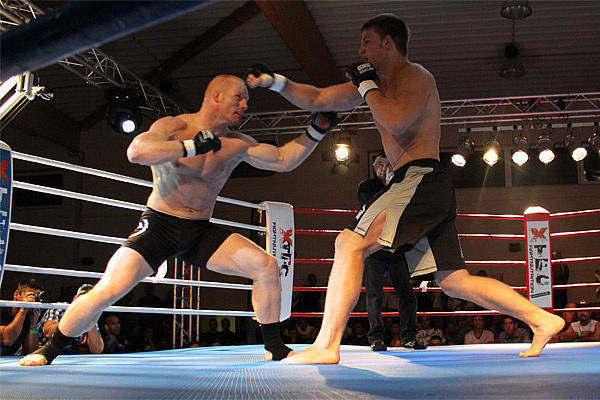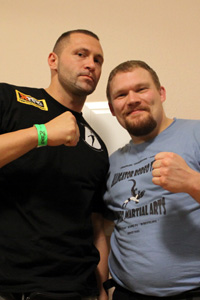Break Down the Walls
Tim Leidecker Oct 13, 2010

Jonas Billstein (right) vs. Mathias Schuck: Tim Leidecker |
Sherdog.com
HERNE, Germany -- There is a spirit of optimism in German MMA now. Despite no TV or mass media presence, barring the odd defamatory contribution, the sport has truly moved onward and upward in the last 16 months, since UFC 99 rolled into Cologne.
Advertisement
The first German promotion to capture a nationwide interest is the upstart German MMA Championship. Saturday night in the city of Herne, GMC held its second event -- aptly titled “Continued” – building on its May debut with a stellar 17-fight card, capped off by two title fights for their newly created European titles, bringing some of the nation’s best young talent into focus.
Four years ago, the country had not produced a single fighter of
international note and was worlds apart from European superpowers
like England, Russia and Scandinavia. That has now changed: the
experienced Dennis Siver
has been a UFC mainstay, and is now joined by other German fighters
in Peter
Sobotta and unbeaten prospect Pascal
Krauss, as well as undefeated Brazilian ex-pat Carlos Eduardo
Rocha, who makes his home in Germany.
Saturday’s main event put two unbeaten light heavyweight prospects in the limelight: former wrestling standout Mathias Schuck, dubbed the “German Brock Lesnar,” and slick 19-year-old wunderkind Jonas Billstein.
Schuck, who had been working hard on his muay Thai for the bout with experienced coach Human Nikmaslak, came storming out of the gate in his usual fashion and went up 20-18 on the scorecards after the first two rounds.
As the fight progressed, Billstein found his rhythm, outlanding Schuck and stuffing his takedowns. Entering the fifth and final round of the championship match, the fight was knotted at 48-48 on the cards. Billstein proved to be the better conditioned athlete, overwhelming the flagging Schuck with strikes, closing the show just 67 seconds into the last frame.
“I kept improving with every round as I managed to adapt to his style better as the fight progressed,” says Billstein, reflecting on the bout. ”He’s an explosive, powerful dude and just overran me in the first couple of rounds. But once I got used to that, I was able to get my game going and I was able to follow the gameplan my coaches laid out for me. Now, I just feel great as that was one killer fight!”
Mike Cüppers, the head coach of Billstein and fellow prospects Nick Hein and Ruben Crawford at the very successful Combat Club Cologne takes the same line: “In the end he improved in every round and showed a very strong performance. This was a true team effort as all guys kept pushing each other in the gym.”
Schuck, who suffered his first career defeat, is honest in self-critique.
“I started well, but as the fight progressed I ended up getting into my old rut and loading up the punches too much. That ended up gassing me out in the fifth round. Full credit to Jonas though: For a 19-year-old, he fought a great fight. I felt like fighting in the UFC.”
In the evening’s other title fight, another set of unbeatens -- former SV Darmstadt 98 soccer defender Christian Eckerlin and Polish import Piotr Hallmann -- vied for the promotion’s welterweight crown. Both fighters gave one another no gifts for three rounds, with Eckerlin having the edge in the standup portions of the fight, while Hallman student dominated the ground fighting aspect.
However, having taken the fight on just three weeks’ notice, Hallmann didn’t have the fitness to hang with Eckerlin in the championships rounds. Just 51 seconds into the fourth round, an exhausted Hallman was dropped to the canvas by Eckerlin, and couldn’t rise to his feet from the knockdown, retiring from the bout.
The card did exactly what any prominent national-level show should seek to: put great domestic up-and-comers against one another, giving them the tough tests that will rouse their improvement, and prepare them for the international stage.
Promoter Özhan Altintas was delighted with his sophomore show that drew 1,100 paying spectators from all across the country to the City Arena in Herne, North Rhine-Westphalia.
“I’m glad the show turned out just as great as it looked like on paper,” says the 32-year-old Altintas, who grew up watching the UFC on VHS. “We wanted the give the German fighters the opportunity to prove who the best is [in the country] and I think we did exactly that on Saturday.”
The Turkish German, who teams up with his partner Deniz Haciabdurrahmanoglu to promote GMC, is also realistic about their future: “We’re not here to compete with the UFC. What we want to be is a credible farm league for the big promotions in Europe and the United States. Carlos Eduardo Rocha, who headlined our first show, managed to take that step and we hope we can help many more fighters make it to the big stage.”
“[The UFC] coming here gives us the impression that they are taking us seriously. And the fact that you can also make it to the UFC as a German fighter, like my friends Peter Sobotta and Pascal Krauss, is also a huge motivation for many aspiring fighters across the country,” adds Andreas Kraniotakes, a German heavyweight featured in EA Sports MMA.
Though it hasn’t made him rich yet, just fighting in the UFC has helped the aforementioned Sobotta’s fight school, “Planet Eater,” in the tiny town of Balingen. Despite Balingen’s population of only 34,000 or so, Sobotta has gained enough students that he can make a living off teaching MMA, something unthinkable not long ago.
However, you can still count the people on one hand who work in the sport – be it fighters, promoters or media – that are able to live solely on MMA. The sport is still held back by a lack of high-profile sponsors, who are reluctant to get involved with MMA because of its antisocial public perception in the nation and the lack of advertising effectiveness due to no TV presence.
Even the UFC, who had been on cable sports channel DSF from March of 2009 until March of this year, are currently struggling to get back on television in a Bavarian courtroom. The defendant, the Bavarian Regulatory Authority for Commercial Broadcasting, managed to get them banned from airing their shows on television. To not provoke the dangerous mixture of uneducated journalists, high-profile neurotic politicians and boxing lobbyists, the UFC’s German promotion team, led by concert mogul Marek Lieberberg has had to keep the media buzz for UFC 122, set for the König-Pilsener Arena in Oberhausen on Nov. 13, to a minimum.
Despite the fact that the behemoth’s hands are tied to further promote the sport in Germany, online media is continuing to boom.
“Our access figures are up by 35% from last year over the last six months,” says Steinky. “We have added a lot of things where it's not possible to imagine German MMA without them like domestic rankings, video interviews before and after the events. The improved coverage has added to the scene and driven a lot of people from other sports to MMA.”
MMA is a global phenomenon; the pseudo-moralizers in German county commissions won’t be its undoing. Just like the political turmoil surrounding MMA in North America at the turn of the millennium, a small hardcore group of thousands of diehard fans are keeping the sport alive and promoting it using the most powerful media tool: the internet. Better still, thoughtfully-promoted domestic promotions, like GMC, are providing the opportunities for German athletes to gain exposure and improve their skills, helping to foster Germany as a hub for the sport.
Even if Germany is in a similar position to the United States in 2001, we’re a few short years away from a great sea change, perhaps even just one season of “The Ultimate Fighter: Germany” away from drastically changing the country’s sporting landscape forever.
Related Articles







